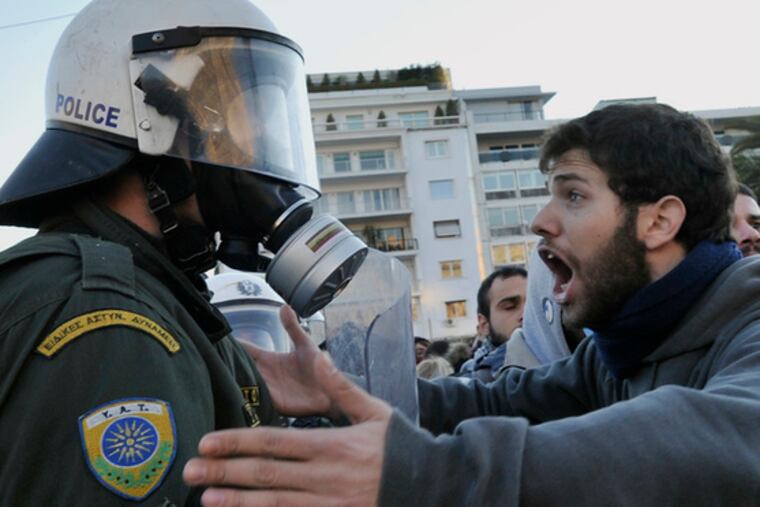Riots threaten Greek government
Angry youths and others rampaged for a fourth day, putting at risk the premier's shaky hold on Parliament.

ATHENS, Greece - Rioters rampaged in Greek cities for a fourth day yesterday in an explosion of rage that was triggered by the weekend police killing of a teenager but that has drawn in an array of antiestablishment parties.
The unrest threatens to topple the government at a time of deep anxiety over growing economic gloom.
Gangs of angry youths have looted and damaged hundreds of buildings, including banks and hotels, torched cars, and shut down much of downtown Athens.
Yesterday, police fired tear gas at protesters after the slain teenager, 15-year-old Alexandros Grigoropoulos, was buried in a funeral attended by an estimated 6,000 people.
Overnight, gangs of masked youths roamed the streets, erecting burning barricades and pelting riot police with rocks and bottles.
High school students joined self-styled anarchists - a group with a history of nighttime arson attacks on businesses and cash machines.
Protests also drew a variety of left-wing groups, though most of their members did not turn violent.
Opposition Socialist leader George Papandreou called for early elections, charging that the ruling Conservatives were incapable of defending the public.
Prime Minister Costas Karamanlis is clinging to a single-seat majority in the 300-member Parliament, meaning that just one defection would likely bring him down and spark elections that polls suggest the opposition would win.
The riots erupted at a time when the government is facing discontent over the economy, the poor job prospects of students, and financial scandals that have rattled public confidence.
However, the protesters have not articulated specific policy goals, and the two leading parties are not far apart on the issues.
Greece, torn by years of civil war between communists and right-wing nationalists after World War II, was ruled by a military dictatorship from 1967 to 1974.
A student uprising helped end military rule but left a legacy of tension between the security establishment and leftist groups that often protest against U.S. foreign policy in the Mideast and elsewhere.
The groups have now evolved into factions that fight trends such as globalization and the proliferation of police surveillance cameras.
Karamanlis came to power in 2004. He has faced growing opposition and occasionally violent demonstrations for pushing unpopular changes to the country's pension system, privatization, and the loosening of state control of higher education, which many students oppose because they feel it will undermine their degrees.
But even if the Socialists came to power, they would likely find themselves implementing many of the same changes that are essential if the economy is to progress.
Police fired tear gas to dispel dozens of youths who were throwing stones and sticks and setting trash cans on fire near the funeral for Grigoropoulos.
The clashes were less severe than those over the previous three nights.
Schools and universities across Greece were closed on the day of the funeral, and hundreds of teachers, university lecturers and students rallied in central Athens. Hundreds of teenagers threw rocks and scuffled with officers. Fighting also continued in Thessaloniki.
"Everyone has let our children down," said Christos Kittas, who quit as dean of Athens University as the riots spread to campuses. ". . . Every day I see that students are becoming more hostile toward us and figures of authority."